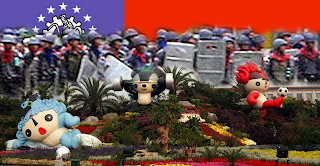
A shadow is beginning to loom over the Beijing Olympics
China is increasingly in the firing line over the ongoing crisis in Myanmar. In the latest development an MEP has called for a possible boycott of the Beijing 2008 Olympics. The vice president of the European Parliament Edward McMillan-Scott is to write to British Prime Minister Gordon Brown and the EU's Portuguese presidency asking them to discuss whether athletes should oppose the Beijing games. "The consensus around the European Parliament is that China is the key. China is the puppet master of Burma," McMillan-Scott told Reuters in a telephone interview. "The Olympics is the only real lever we have to make China act. The civilized world must seriously consider shunning China by using the Beijing Olympics to send the clear message that such abuses of human rights are not acceptable." Besides China, several other countries have business and economic interests with Myanmar. India and France have strong economic ties. The UK and the US have small interests in the country, particularly with regards the export of hard woods [BBC]. China is being particularly singled out because of its arms trade with the military junta. Trade between the two countries rose to $1.46 billion in 2006, a 20% increase over the previous year. China has built bridges, power plants, stadiums and factories in the country which it also sees as important to its expanding search for energy supplies and raw materials as well as opening up a network of ports along the Indian Ocean.
But how strong is Beijing’s influence over the Myanmar government? Time Magazine quoted Zhai Kun, an expert on Southeast Asia at the China Institutes of Contemporary International Relations, as saying, "I think China has very little influence; you can compare it to the influence China has over North Korea. The expectations from the West are that China has influence, but because Myanmar is a closed society, I don't think they listen to advice from the outside, including China."
China has made few public comments in relation to the current crisis, but on Thursday this week Jiang Yu, a spokesperson for the Chinese Foreign Ministry said, "We hope all parties continue to exercise restraint and properly handle the current issue." The spokeswoman stopped short of condemning the killings and accused the western press of “exaggerating and hyperbolizing” allegations that China had not taken a more constructive role [CNN]
No comments:
Post a Comment